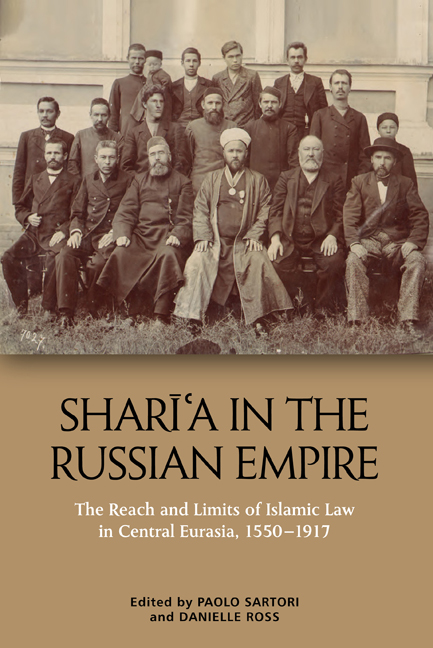Book contents
- Frontmatter
- Contents
- List of Contributors
- Introduction: The Reach and Limits of Sharīʿa in the Russian Empire, c.1552–1917
- 1 Islamic Education for All: Technological Change, Popular Literacy and the Transformation of the Volga-Ural Madrasa, 1650s–1910s
- 2 Taqlīd and Discontinuity: The Transformation of Islamic Legal Authority in the Volga-Ural Region
- 3 Debunking the ‘Unfortunate Girl’ Paradigm: Volga-Ural Muslim Women’s Knowledge Culture and its Transformation across the Long Nineteenth Century
- 4 Between Imperial Law and Islamic Law: Muslim Subjects and the Legality of Remarriage in Nineteenth-century Russia
- 5 Islamic Scholars among the Kereys of Northern Kazakhstan, 1680–1850
- 6 Tinkering with Codification in the Kazakh Steppe: ʿĀdat and Sharīʿa in the Work of Efim Osmolovskii
- 7 Taqlīd and Ijtihād over the Centuries: The Debates on Islamic Legal Theory in Daghestan, 1700s–1920s
- 8 Kunta Ḥājjī and the Stolen Horse
- 9 What We Talk about When We Talk about Taqlīd in Russian Central Asia
- 10 Take Me to Khiva: Sharīʿa as Governance in the Oasis of Khorezm (Nineteenth Century–Early Twentieth)
- Index
10 - Take Me to Khiva: Sharīʿa as Governance in the Oasis of Khorezm (Nineteenth Century–Early Twentieth)
Published online by Cambridge University Press: 22 September 2020
- Frontmatter
- Contents
- List of Contributors
- Introduction: The Reach and Limits of Sharīʿa in the Russian Empire, c.1552–1917
- 1 Islamic Education for All: Technological Change, Popular Literacy and the Transformation of the Volga-Ural Madrasa, 1650s–1910s
- 2 Taqlīd and Discontinuity: The Transformation of Islamic Legal Authority in the Volga-Ural Region
- 3 Debunking the ‘Unfortunate Girl’ Paradigm: Volga-Ural Muslim Women’s Knowledge Culture and its Transformation across the Long Nineteenth Century
- 4 Between Imperial Law and Islamic Law: Muslim Subjects and the Legality of Remarriage in Nineteenth-century Russia
- 5 Islamic Scholars among the Kereys of Northern Kazakhstan, 1680–1850
- 6 Tinkering with Codification in the Kazakh Steppe: ʿĀdat and Sharīʿa in the Work of Efim Osmolovskii
- 7 Taqlīd and Ijtihād over the Centuries: The Debates on Islamic Legal Theory in Daghestan, 1700s–1920s
- 8 Kunta Ḥājjī and the Stolen Horse
- 9 What We Talk about When We Talk about Taqlīd in Russian Central Asia
- 10 Take Me to Khiva: Sharīʿa as Governance in the Oasis of Khorezm (Nineteenth Century–Early Twentieth)
- Index
Summary
Introduction
In the autumn of 2010 we toured Khorezm, a region nestled between modern Uzbekistan, Turkmenistan and Kazakhstan, to inspect private manuscript collections. It was the end of September and, on account of the balmy weather favourable to our travelling, we thought it would be the most propitious moment to head to Nukus, the capital city of what is today Karakalpakstan. Our informants had told us about a manuscript library belonging to a local savant, himself scion of a family of scholars of Islamic sciences, called Sotiboldi Umarov. In fact, the library did not have many surprises for we had encountered similar collections along our way. As we leafed through the various items, however, we came across a rescript addressed to the chancellery of the Qonghrat Khans of Khiva, the last Muslim dynasty to rule over Khorezm prior to Sovietisation. The record offered a concise account of a dispute solved by representatives of the Qonghrats, a legal practice that we shall discuss further in this chapter. As we paused to read this record, the owner of the manuscript told us a story from his childhood memories. The story took place in the second half of the 1980s in Janbulak, a small village in Karakalpakstan located in a desert area to the east of To’rtko’l. His maternal grandmother, Umarov told us, an elderly and infirm woman, was staying in his uncle's house and he visited her quite often. During these visits his grandmother repeatedly complained about her eldest son who pressured her to bequeath her property, a house and a large garden, solely to him. Whatever the facts of the matter, the stubborn behaviour of his uncle forced his mother and aunt to act very cautiously in deference to their brother. It was decided therefore to resolve the situation by involving a former fellow village man and a distant relative, who at that time lived in Nukus and held a high position at the provincial Ispolkom (Rus. ‘Executive Committee’).
One Sunday morning, as had been agreed beforehand, Umarov's relatives travelled to Janbulak and waited for the man from the Ispolkom to arrive from Nukus.
- Type
- Chapter
- Information
- Shari'a in the Russian EmpireThe Reach and Limits of Islamic Law in Central Eurasia, 1550-1917, pp. 328 - 362Publisher: Edinburgh University PressPrint publication year: 2020



